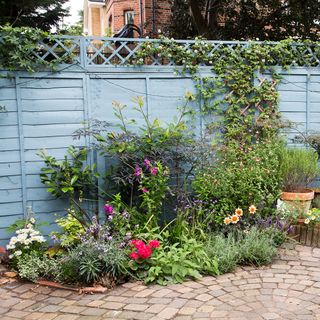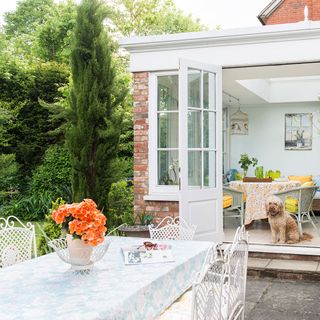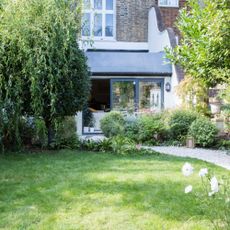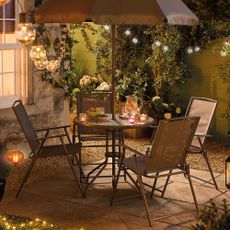Are you breaking the law in your own back garden?
Garden experts have identified 10 ways you could be acting beyond the law – from poorly positioned trampolines to unruly branches

With hot summer weather finally here, many of us will be out in our gardens looking for things we can improve and tidy up. However, before you crack out the trimmer or start planning changes to your garden shed, you need to know some of the more unexpected legal elements of gardening.
It is very easy to find yourself on the wrong side of the law just by trimming off a branch, removing a bird's nest, or (shock horror) switching on your hot tub at night. All of these points are especially important for city dwellers, whose outdoor spaces are typically smaller and border someone else's. Don't let your small garden ideas cost your a hefty fine – be aware of these top ways you can break the law in your own backyard.
1. Beware of trimming overhanging branches...

Those pesky branches overhanging your fence from next door's garden might be annoying, but prune them at your peril. You're totally within your rights to cut back branches that hang into your property, but you must not cut past the boundary line and you must check they aren't protected by a Tree Preservation Order, beforehand. If you cut branches off a protected tree, you could be fined thousands in some cases.
You're also on rocky ground if you lean into your neighbour's garden to make your cuts, as it could constitute trespass. If your gardens are bounded by a hedge, you're equally responsible for trimming it.
2. ...And don't keep them without your neighbour's permission
Any branches that you do chop off, even if they were on your property, still belong to your neighbour. That goes for any fruit or flowers on them. However, what you do with them is tricky.
Technically, your neighbour could ask for them back, so think before putting them on the bonfire. However, you can't just throw them back into your neighbour's garden, as that could amount to garden waste fly tipping!
Our advice is therefore to always consult with your neighbour, and save yourself any future hassle.
Get the Ideal Home Newsletter
Sign up to our newsletter for style and decor inspiration, house makeovers, project advice and more.
3. Don't take windfallen fruit without asking, either

As with pruned fruit and flowers, windfallen fruit technically still belongs to whoever owns the tree. So before you go making jam or chutney from any apples or plums that end up on your lawn, you should by law ask if you can have them.
4. Think carefully before planting a tree

If it's anywhere near a window, you could be in trouble. Under the Rights of Light Act, if that window has received natural light for 20 years or more, it can't be blocked with a new tree.
5. Know your boundaries
So you've decided to give your fences a tasteful paint makeover – or even replace them. Before you do, though, it's wise to check the title deeds to your property and check who actually owns the fences.
It's not always the case that whoever owns the fence is legally responsible for its upkeep – it varies from deed to deed. If you're in any doubt about boundaries, you can contact HM Land Registry for clarification. It's best to do this before investing in garden fence ideas – in case the fence isn't actually yours.
6. Could your hot tub be a noise nuisance?

You might think there 'ain't no party like a hot tub party' but your neighbours may not agree. The vibrations they create can constitute noise pollution, and you could be reported for it, especially if you're enjoying a late-night dip. It might be worth checking with the Joneses next door before you have one installed – and perhaps invite them to use it once in a while!
7. Be sensible about smoke
It's not just the noise of a hot tub that could cause an issue. Excessive smoke drifting over from a barbecue or chiminea could get you into trouble with the law, too. Depending on where you live, but especially in urban areas, your neighbours are well within their rights to report your bbq – or fire pit, for that matter – if it's producing excess smoke.
Make sure that any wood you're burning is specialist firewood that has been fully dried. And choose the best bbq that won't produce too much smoke while still giving you that desirable smoky flavour.
8. Position your trampoline thoughtfully
Garden trampolines are great for keeping the kids entertained. But if they are bounce-bounce-bouncing away in a spot where they can see into your neighbours' gardens or homes, you could be invading your neighbours' rights to privacy.
'It can be easy to fall into the trap of thinking that just because you own or rent your property, you’re well within your rights to do whatever you want in it – including in your garden,' says a spokesperson for GardenBuildingsDirect.co.uk. 'But the fact of the matter is that if you have neighbours – which most Brits will – you have to be mindful of their rights, too.'
'There may be times when it would be within your legal right to take action if your neighbour has acted beyond the law, but it could cause tensions. We’d always advise trying to come to a neighbourly solution first, as this is always preferable to having to call in the lawyers. And if you brush up on the law as it stands, you may be able to avoid any sort of dispute altogether, which is always the ideal solution.'
9. Make sure you know the planning rules around sheds
A quarter of UK gardeners still believe that they don't need planning permission for a garden shed, so long as it's not used as a living space. This is wrong – your garden shed ideas need to conform to permitted height and size limits in order to qualify for not needing planning permission.
The best thing is to consult with your local council and check that your shed is within the limits. If you don't you could be fined – or worse, be asked to take down the structure.
10. Don't remove any birds' nests you find in your garden
The vast majority of wild birds' nests in the UK are protected under the Wildlife and Countryside Act 1981. This includes the nests of starlings, sparrows, pigeons, and seagulls.
You must not remove any bird's nest while it is still in use or being built. Most people won't be able to tell whether a bird's nest is still active, so avoid removing any nest, even if you think it's a nuisance. Even if you hire pest control to remove a nest – you will still be held legally responsible. If you have a bird's nest in your garden and ideally would like to have it removed, contact the RSPB for advice.

Amy Cutmore is an experienced interiors editor and writer, who has worked on titles including Ideal Home, Homes & Gardens, LivingEtc, Real Homes, GardeningEtc, Top Ten Reviews and Country Life. And she's a winner of the PPA's Digital Content Leader of the Year. A homes journalist for two decades, she has a strong background in technology and appliances, and has a small portfolio of rental properties, so can offer advice to renters and rentees, alike.
-
 How to care for a lawn in shade – expert tips for lush green grass in a shady garden
How to care for a lawn in shade – expert tips for lush green grass in a shady gardenShady garden? No problem! You can still have the lawn of your dreams with just a few tweaks...
By Kayleigh Dray
-
 Aldi is selling a complete outdoor dining set that is perfect for springtime soirees – for only £100
Aldi is selling a complete outdoor dining set that is perfect for springtime soirees – for only £100It's the ideal finishing touch to a stylish patio
By Jullia Joson
-
 This George Home garden furniture set sold out within days – but the designer lookalike is finally back in stock
This George Home garden furniture set sold out within days – but the designer lookalike is finally back in stockSo snap yours up before it's gone again!
By Sara Hesikova